What is a product configurator: Advantages of product customization
How important is product customization and what exactly is a product configurator?
These 2 questions are one of the most trending questions today for both B2C and B2B companies. We’ve come to know that personalization is one of the most important factors in forming a buying decision.
This statement has proven to be true many times and for many years until now. Today, we’re taking personalization to a higher instance. Instead of delivering customers products personalized exactly for them – why not let them create their own personalized and unique product? If we do that, what kind of results are we going to experience?
In this week’s article, you’ll learn more about product configurators, product customization, and the pros and cons of product customization. Also, we’ve got some examples prepared for you, so be sure you don’t miss them!
And if you’re looking for a reliable partner to help you out with building a product configurator and ensuring you reap all the benefits of product customization – we’d be happy to help!
We’re experts in Pimcore development and one of the Pimcore Gold solution partners. You name it – we build it!
Now, let’s talk more about product configurators!
What is a product configurator?
Simply said, a product configurator is a piece of software that functions as a collection of all parameters and characteristics of a certain product. Solutions offered by a product configurator are previously determined by the configuration logic.
The product configurator visualizes the product rules that require input from your users to finish. Naturally, this needs to be done before the order is sent to the production team.
In essence, the product configuration is an interactive process between the product configurator and the user. The user chooses a feature, the configuration engine validates the decision, and the user can move on to making the next decision.
On the outside, this process seems simple. But it hides the complex structure of the product configurator and its vast number of product configuration rules.
Quick note here! To handle such large volumes of product information, digital products such as PIM system can help you out! Find out more about Pimcore’s PIM system and how it can stay on top of your product information!
Now when we know how a product configurator works, let’s see if it would suit your business and what kind of advantages does it bring to the table!
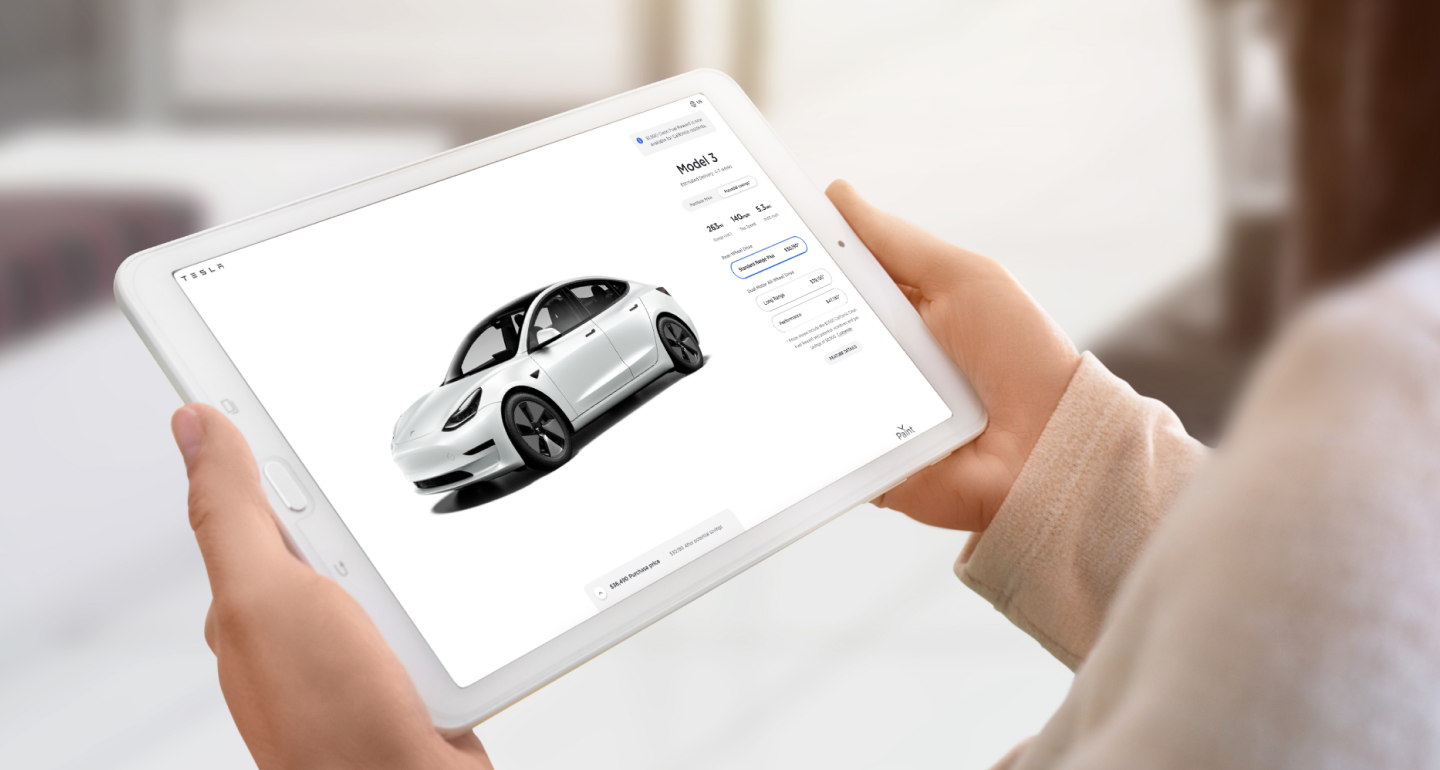
Does your business need a product configurator?
It’s a fair question. Not every business needs a product configurator. If your business is handling a large number of products and each product has more than 3 features – it seems you do need a product configurator.
Let’s review some common situations:
- You want to test new models and options for your products?
There’s no need to spend any resources on actually manufacturing a new product. You can create a virtual version of the product and test it out in a product configurator. If its’ a 3D configurator you’re working with – you can create 3D models of your products and gain even more insight.
- You’re struggling to find the winning product amongst your complete offering?
If you have a great number of products and you’re looking for a winner – a product configurator can be of use. By analyzing your customers’ decisions when configuring their own products, it’ll be easier to identify the most successful versions of the product and focus on manufacturing more of these winning products.
- Your sales team is spending more time recording order details, rather than selling?
Simply said, the product configurator does the job. It records all of the order details, and after your sales representative approves the order (which is already verified via the configuration logic) – the order is instantly sent to the production team.
These are some common situations you’ve already probably encountered. A product configurator can take a lot of load off your team and optimize your entire sales process.
But let’s dig deeper into the benefits of a product configurator!
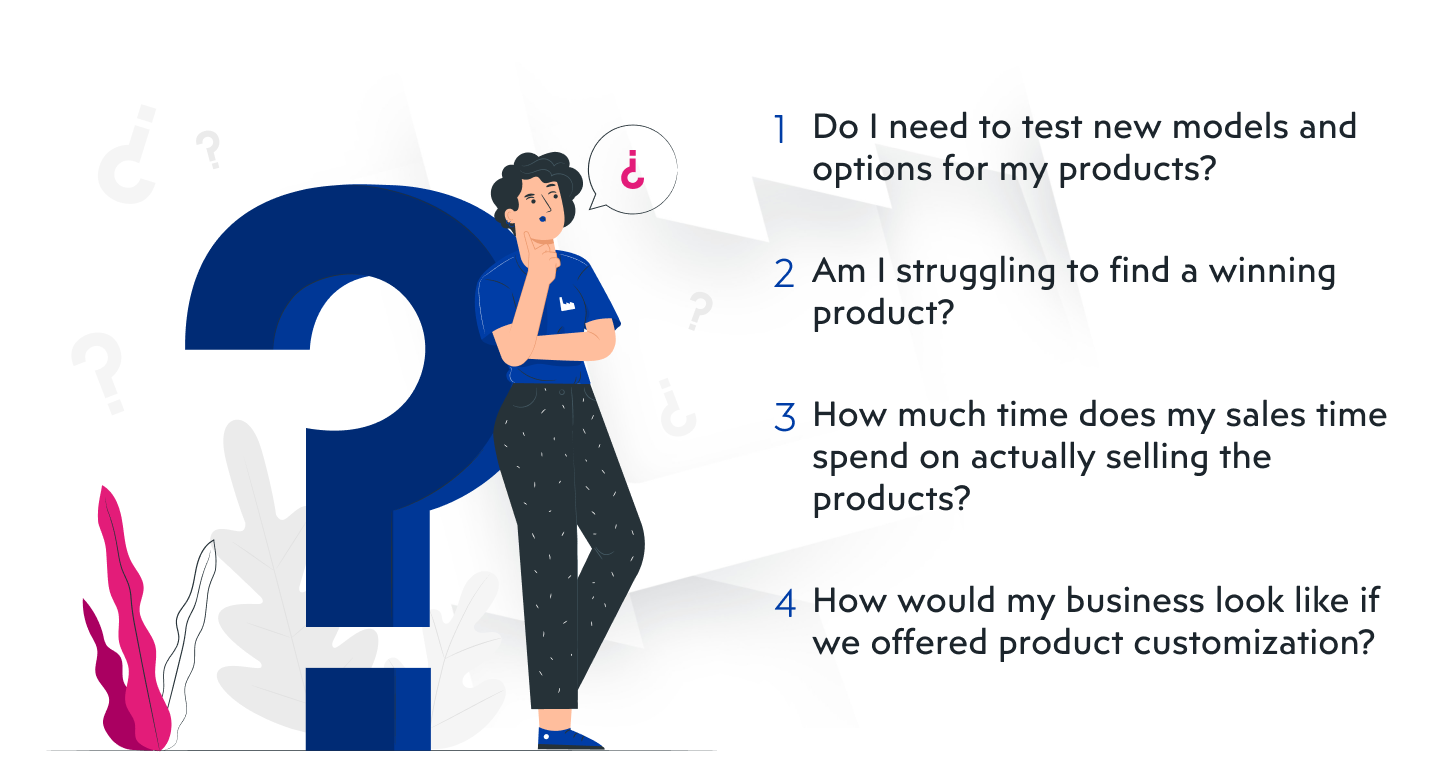
Benefits of a product configurator
There’s a number of benefits to using a product configurator. The same benefits apply to both B2B and B2C companies, and range from improving sales processes to increasing customer satisfaction.
Product configurators ensure that manufacturers get the right order
By using a product configurator, you’ll easily ensure that every customer receives exactly what they ordered. Customers can now build their product themselves and after they’re finished – the whole order is saved and sent directly to your manufacturing team. Customers can feel safe knowing that there won’t be any issues with their order. Finally, your manufacturing team won’t have any mistakes issued in the order so they’ll have a few worries less.
Product configurators reduce lead times
Every product your customers create is going to end up being unique – or it’s going to end up being a certain edition of the product. Because you implemented a product configurator, your sales process is going much smoother.
Customers build the product themselves, and your sales representatives already have information on these specific product editions and they can immediately see the order which the customer filled out.
Instead of recording order details – your sales reps are actually selling! The time needed to create a quote is greatly reduced and the information is instantly sent to the manufacturing team.
Product configurators increase customer satisfaction
When using a product configurator, customers are making sure that they create the product they consider ideal for them. The only limitations they have are the ones defined by the configuration rules – and they exist for the sole purpose of making sure that the product is fully functional and it can be manufactured without issues. For instance, you wouldn’t put a brass knocker on a glass door. It just wouldn’t make any sense.
But to put ourselves in the shoes of the customer – how often did we order something and receive the wrong order? Maybe it was the wrong product color or the wrong size – it most probably happened at least once. Or maybe some of your friends or colleagues had the same issue – and it had a substantial impact on customer satisfaction.
When using a product configurator – you’ll be sure that these kinds of situations won’t be happening.
Product configurators provide you with a chance to connect with your customers
Finally, product configurators make sure you can connect with your customers. A lot of people love shopping online, but using product configurators – it’s even better. It’s like assembling your own unique LEGO house, and sometimes even sharing pictures of it between your friends because you’re proud of how the LEGO house turned out to be. That’s the effect you’re trying to achieve.
The more options a customer has at its disposal, the deeper they can connect with that product. With every additional feature customized, they’ll be adding a piece of their signature on it. If you were wondering how to create an emotional connection with your customers – this is the way.
There are more benefits that come with implementing a product configurator, but let’s see what kind of product configurator you can actually implement in your business.
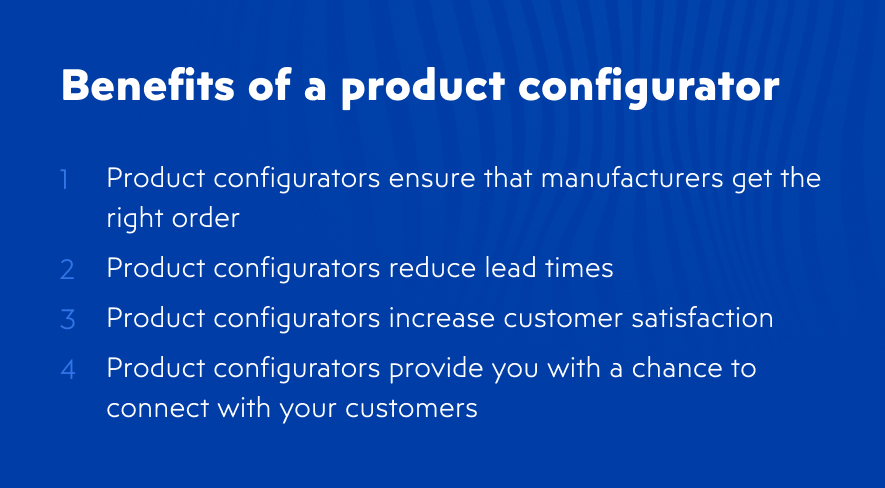
Types of product configurators
Earlier, we’ve identified 4 major types of product configurators. Each of them serves a different purpose, but the core use is the same for all 4 types. When choosing which product configurator suits your business the best, it’s important to assess some factors such as target audience and long-term business goals. Also, keep in mind that the more complex your product gets – the more complex your product configurator needs to be.
1. Marketing product configurator
The purpose of a marketing product configurator is to visually represent a complex product that otherwise couldn’t be presented using traditional documents. It’s not used for creating quotes and accurately determining prices, but it fully serves its purpose.
Mainly, they arouse creativity with your target audience. They’ll be able to visualize how the end product is going to look, and when we’re talking about some complex products – it comes in really handy.
One such product is the building facade. Now, presenting a building facade by using traditional documents isn’t really easy to do, and honestly – by using a product configurator you can do a much better job at visualizing it.
Check out this example of a marketing product configurator – Alucobond Facademaker. It serves as an inspiration for architects and engineers working on a facade project. The end goal of this marketing product configurator is to ensure that both architects and engineers see Alucobond as their ideal panelization solution provider. And they’re doing a great job!
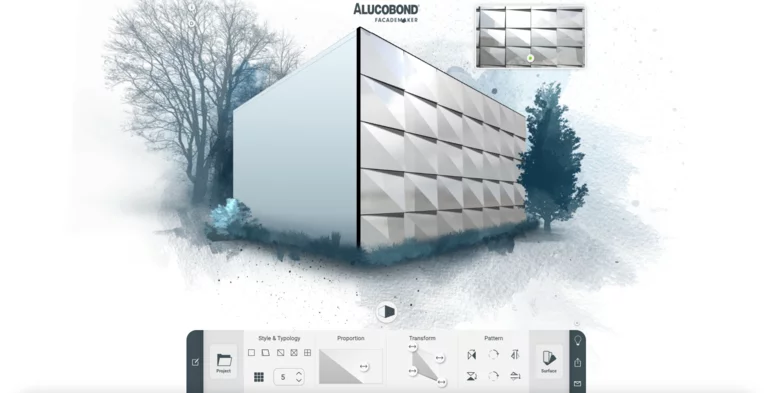
2. Commercial product configurator
This particular type of product configurator is common in the eCommerce industry. A majority of us have already encountered this type of product configurator throughout our lifetime – and some of them made such a great impact that we instantly connected with the brand.
A commercial product configurator offers direct sales or a detailed quote on which your sales representative can instantly follow up and close the deal. One popular example is the Nike ID (now known as Nike by You) that allows customers to customize their new pair of shoes to the smallest detail.
But let’s take a look at another example – Tesla! Not only did Elon Musk start an electric vehicle revolution, but he also reinvented how we buy cars. This 3D product configurator allows you to fully customize your Tesla, and view all changes in real-time. An extraordinary example!
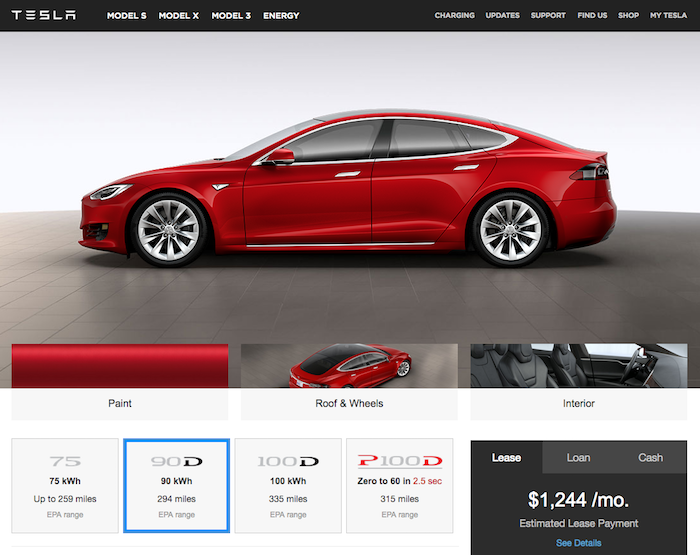
3. Technical product configurators
Technical product configurators go to the greatest lengths when it comes to details. They may lack the realistic visualization of both marketing and commercial configurators, but they cover the product variations better than the previously mentioned product configurators. This type of product configurator is often used in B2B sales, so if you’re in B2B – be sure to consider this one if it suits your needs!
As said, they do an incredible job when it comes to generating bills of materials, and even CAD files that are needed for manufacturing! Here’s one great example of a technical product configurator. Habitat 21, a company specialized in modular houses, uses a technical product configurator to enable users to build their own houses.
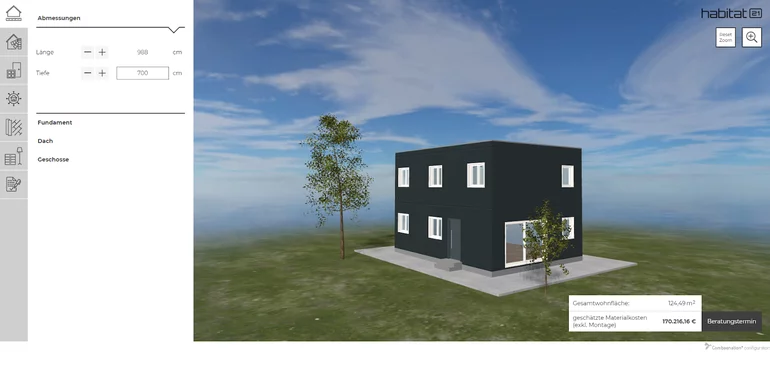
4. Internal configuration tools
This type of configurator may not be used in direct sales, as its main purpose is to help CAD engineers and designers communicate with decision-makers and machine operators. Collaboration features are crucial for this type of product configurator, so if the nature of your business includes regular communication between engineers, designers, and decision-makers – you may want to consider this configurator!
The complete information about the product is too complex in this case, so these tools never full contain it. The goal is to model and optimize particle processes and create stronger connections between several stakeholders.
For example, check out this tool, created by ShapeDiver. An architecture firm – Skidmore, Owings and Merril LLP – uses it to facilitate decision-making in their team. And it’s working really well for them!
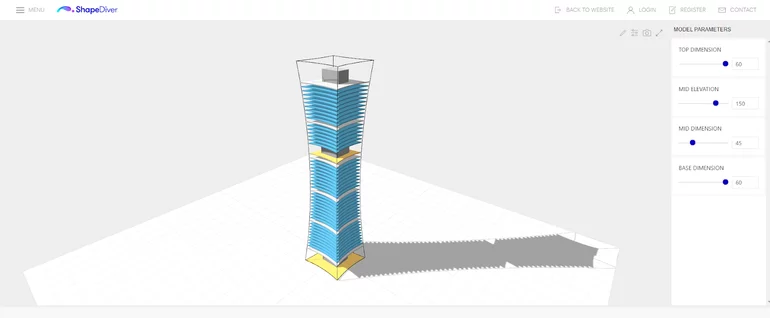
Now, let’s see how does this whole process of product customization impacts your customers!
How does product customization impact customers?
Let’s start with a common example. You’ve opened your Netflix account and there they are – 4 Spanish TV series, an advertisement for an Indian horror movie, and a few movies you’ve already watched and didn’t actually enjoy them. The first instinct would be to just leave Netflix and start wondering – what went wrong?
Fortunately, Netflix is one of the platforms that boast an extraordinary product customization. From different cover images for movies and TV series, to extremely accurate recommendations – Netflix does them all. Sometimes, they’re so good that we can’t decide what to watch (amongst great recommended titles) even after 20 minutes of searching – but that’s on us!
Product customization is the key to serving your customers successfully. Keep in mind that not every customer will want to use your product the same way.
Product customization is paramount for delivering personalized customer experience to each and every customer. By doing this successfully, you’ll drastically increase both customer loyalty and satisfaction.
Customization today is almost made an imperative, as it’s become a common occurrence in a large number of companies. And that’s not a bad thing! Improving customer satisfaction through product customization is a good way to make sure you retain your customers!
Also, Deloitte made an interesting find in its recent research! According to their research, 1 out of every 5 customers is willing to pay 20% more for a personalized or exclusive product. Why is that so?
Customers who can customize their products to their likings will find value through this form of a unique product, or even through the form of a feature such as product configurator.
Product customization has a substantial impact on your customers, and there are many benefits to using it. But are there any disadvantages? In the next section, we’ll review both advantages and disadvantages of product customization, so – stay with us!
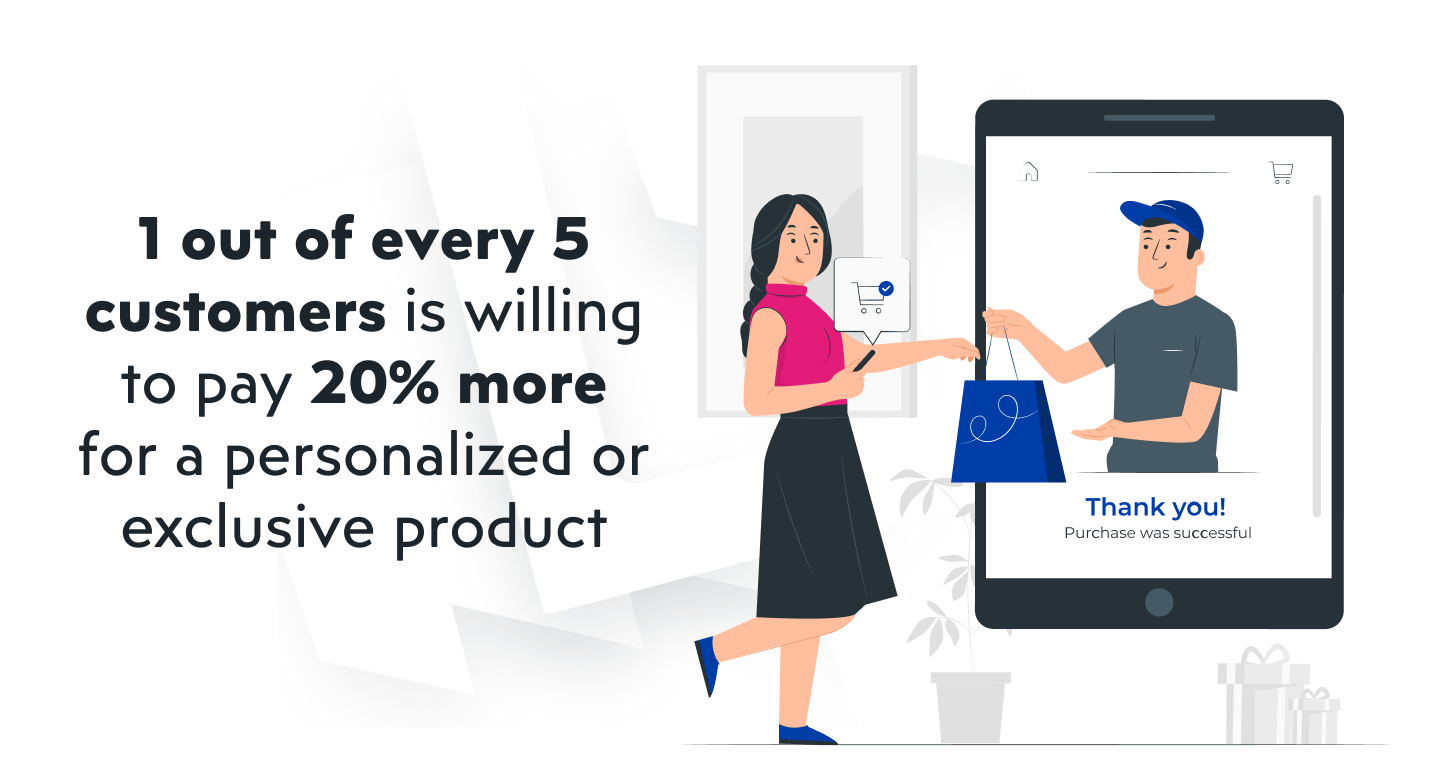
Advantages and disadvantages of product customization
Even though product customization may seem as a flawless concept, there are some obstacles you may want to consider first before implementing these features.
Here, we’ll go through both advantages and disadvantages of product customization, after which you can weigh out pros and cons to come to a final decision.
Advantages of product customization
There’s a ton of advantages of product customization, so let’s dive right into them, and name several of them!
- You can generate more sales by implementing product customization
Alongside the increase in sales revenue, implementing product customization keeps your customers satisfied, promotes loyalty and often results in word-of-mouth recommendations!
As mentioned several paragraphs earlier, 1 out of every 5 customers is ready to pay 20% more for a customized product! And 36% of customers would consider buying a customized product or a service. Customers are no longer taking only monetary cost into consideration. They’re rather moving towards taking full product value into consideration, and this opens a window for companies trying to shift to new sales strategies.
And another interesting statistic to point out (from the Deloitte research) is – around 48% of customers would be willing to wait longer for a customized product or a service! Having outstanding shipping times in pair with advanced product customization may clearly seem as a winning strategy!
- You’ll stand out from the crowd
Product customization functions as a strong differentiating factor. When looking from a customer’s perspective, shopping in a store with more than 100 different variants for a product, and customizing your own unique product are two completely different experiences!
A majority of customers are likely to gravitate towards companies that offer product customization. The fact that customers themselves become a part of the process of creating the product adds immense value to the product and instantly creates an emotional connection between the customer and the product.
- Product customization is directly linked to better customer insights
Customer data, information on buying habits, and consumer trends are valuable assets to have in any kind of business. Having your own unique way of gaining customer insights can be a strong competitive differentiator. By allowing your customers to customize their own products, you get to know your customers in ways your competitors can’t, as it’s completely unique to your business. And if you’re wondering how you can handle all of that customer data – check out our article on Pimcore’s customer data platform!
Make sure you’re keeping track of the right metrics! Check out our guide to eCommerce analytics to stay in the loop on the most important metrics that define your business!
- Product customization positively impacts customer loyalty
Allowing customers to create their own products in your product configurator has a substantial impact on customers’ satisfaction level. This is an adaptation to the customer at the highest level, and one of the best ways to build customer loyalty.
By making sure your customers interact with your business through the process of product customization, , they’re more likely to establish an emotional connection and a lasting relationship with your brand. Once they establish that connection, it’ll get harder for your competitors to win them over.
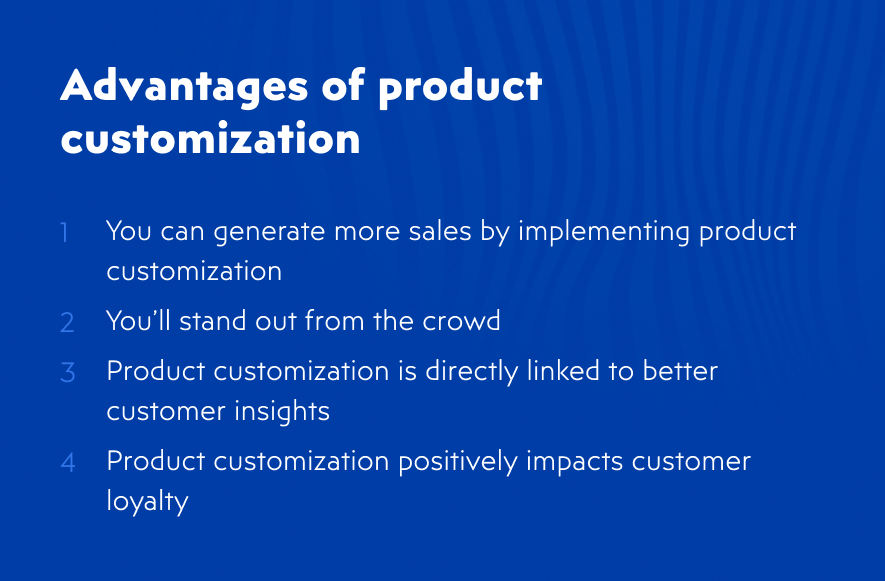
Disadvantages of product customization
Even though product customization comes with tons of benefits and advantages, there are some obstacles that you may encounter along the way. Let’s take a look at some of them!
- High implementation costs
Even though product customization works perfectly well in theory, it’s not the easiest feature to implement on eCommerce websites. Also, keep in mind that there’s a number of features alongside product customization that you may want to implement on your eCommerce website. Check out our list of eCommerce website features from where you can find the inspiration! Such a project requires that you have a reliable solution partner by your side who will put in their greatest effort to make it work flawlessly.
Alternative to building your own product configurator is using various product customization software, which often level you with too few choices which don’t apply to the unique nature of your business. Initial costs of building your own product configurator and establishing a product customization process may be somewhat larger, but it’s an outstanding investment in your customers’ experience. Most importantly of it all – it pays off!
- Challenging management of customer experiences
Today, when 1-day and same-day delivery has become a standard, there are numerous huge discounts active at any time, and competitors are aggressively altering their prices – users will expect more from your business. Thus, when the price of your product increases due to product customization – not every user is going to be fond of this. This is an obstacle that many companies faced already and there’s a clear solution for this.
To overcome this obstacle, you’ll need to manage your customers’ expectations.
Make it clear to your customers that product customization itself is a premium service, as it indeed is a premium service of the highest level. This fully justifies the increase in the product price and the prolonged delivery timelines.
- It may initially slow down the manufacturing process
Each customized product your customers design will have its own type of production logistics that go along with it. As it’s not possible to predict every single product combination that your users will build, you’ll encounter some novelties along the way.
The production timeline for customized products may be different than the product timeline for predefined product combinations. Also, be sure to prepare your inventory for new customer demands! It may take a few months to find out which specific product combinations are bestsellers and according to your new customer insights – you’ll have easier time managing your inventory.
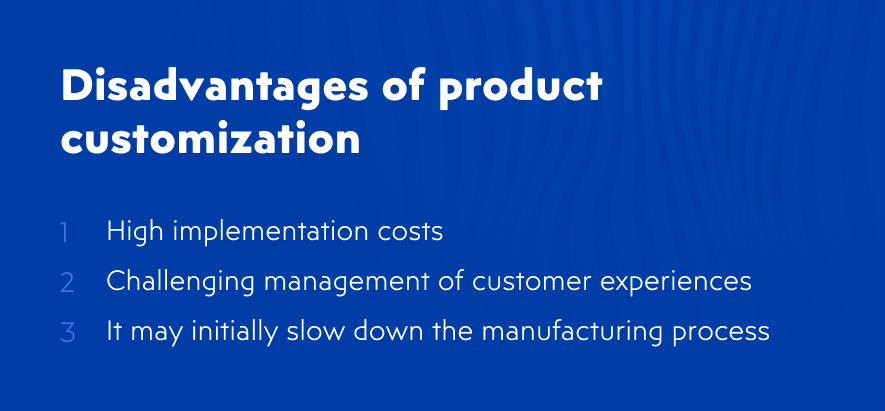
Finally, let’s take a look at some prominent examples of product customization and see some results!
Examples of product customization
There are a few examples of product customization you’ll see in this section, so let’s get right into it!
Nike finds great success with product customization
We all know Nike as one of the greatest retailers in the sports shoes and apparel industry. They wanted to increase the revenue that comes through their Direct to Customer sales channel, and product customization appeared as the best solution.
At first, they sold customized shoes for around $170, which resulted not only in increased sales revenue but also huge PR for innovation. Their product configurator was first named Nike ID, but over time they’ve renamed it into Nike by You.
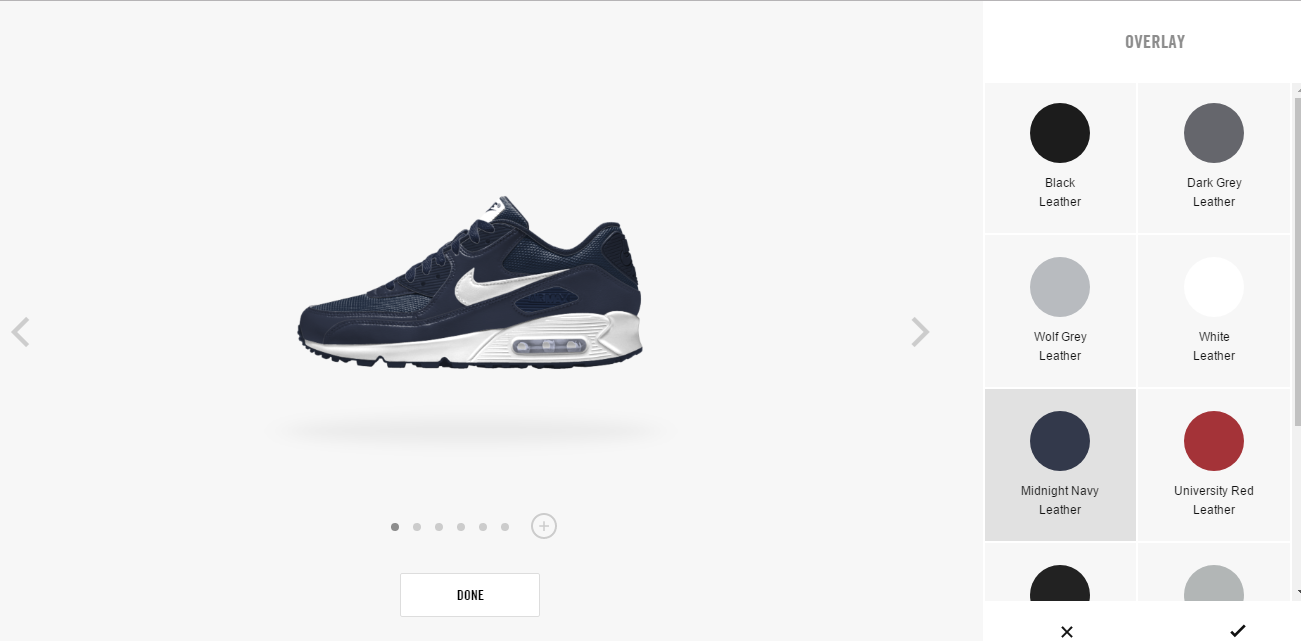
Top US planner brand takes advantage of product customization
Blue Sky, the #1 planner brand in the USA, has fully adopted the process of product customization, and through their product configurator, they offer their customers an array of premium and customizable planners.
Customers can use their own images, choose from already uploaded and predefined images, customize the frame style, color, fonts, change the design of the planner, format, and much more. They gave their customers full liberty to customize their planner however they want. This bold move has positively impacted their sales and they’ve seen an increase in sales by 20%.
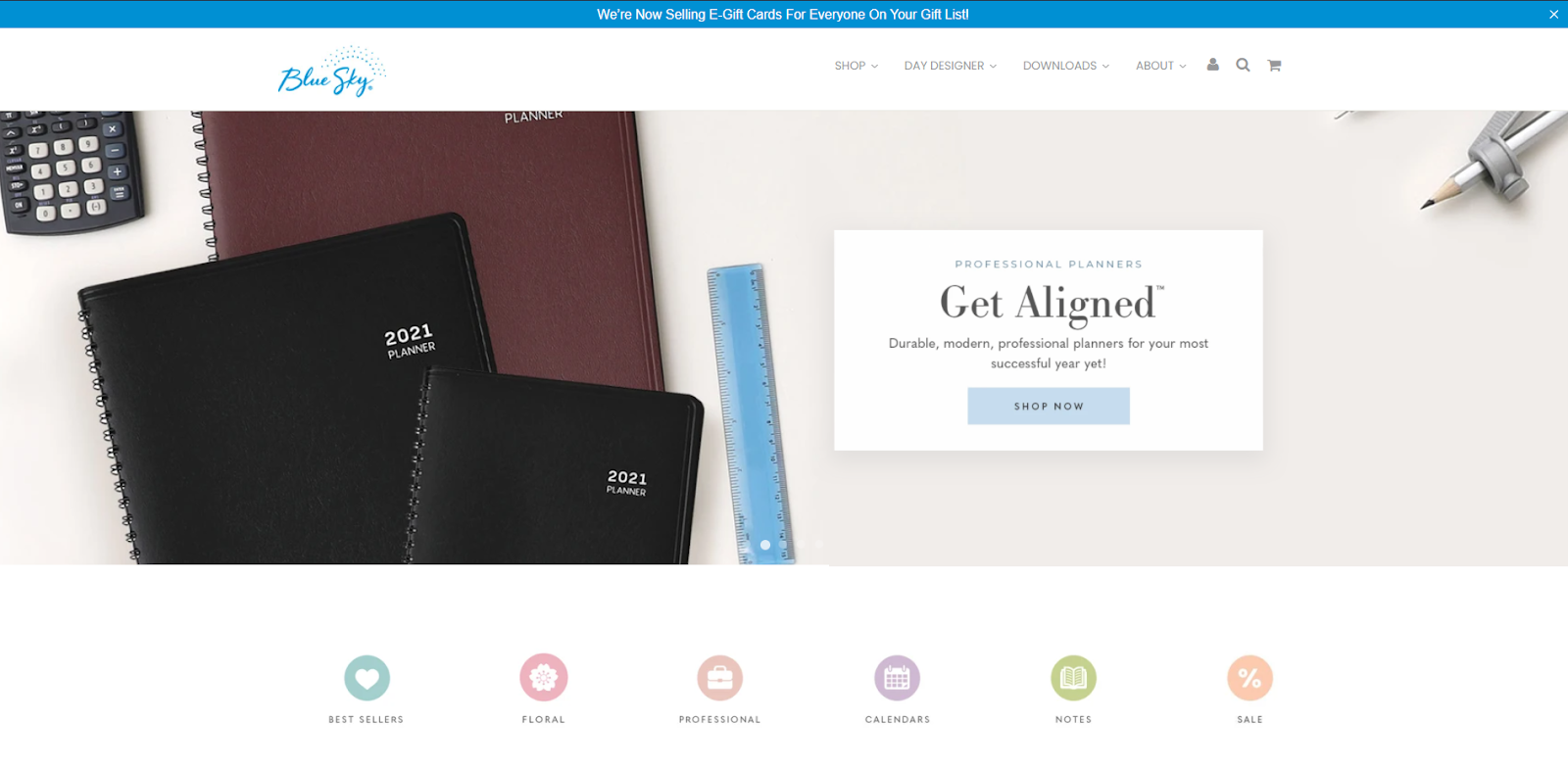
A luxury online dog boutique sees an increase in conversion rate thanks to product customization
Susan Lanci Designs, a luxury online dog boutique, offers dog accessories of highest quality, comfortability, and superior safety. They’ve seen an opportunity to implement product customization in their eCommerce business, and this resulted in allowing customers to customize every detail of their dog’s new accessories. Thanks to this new feature, they’ve seen an increase in conversion rate by 9%.
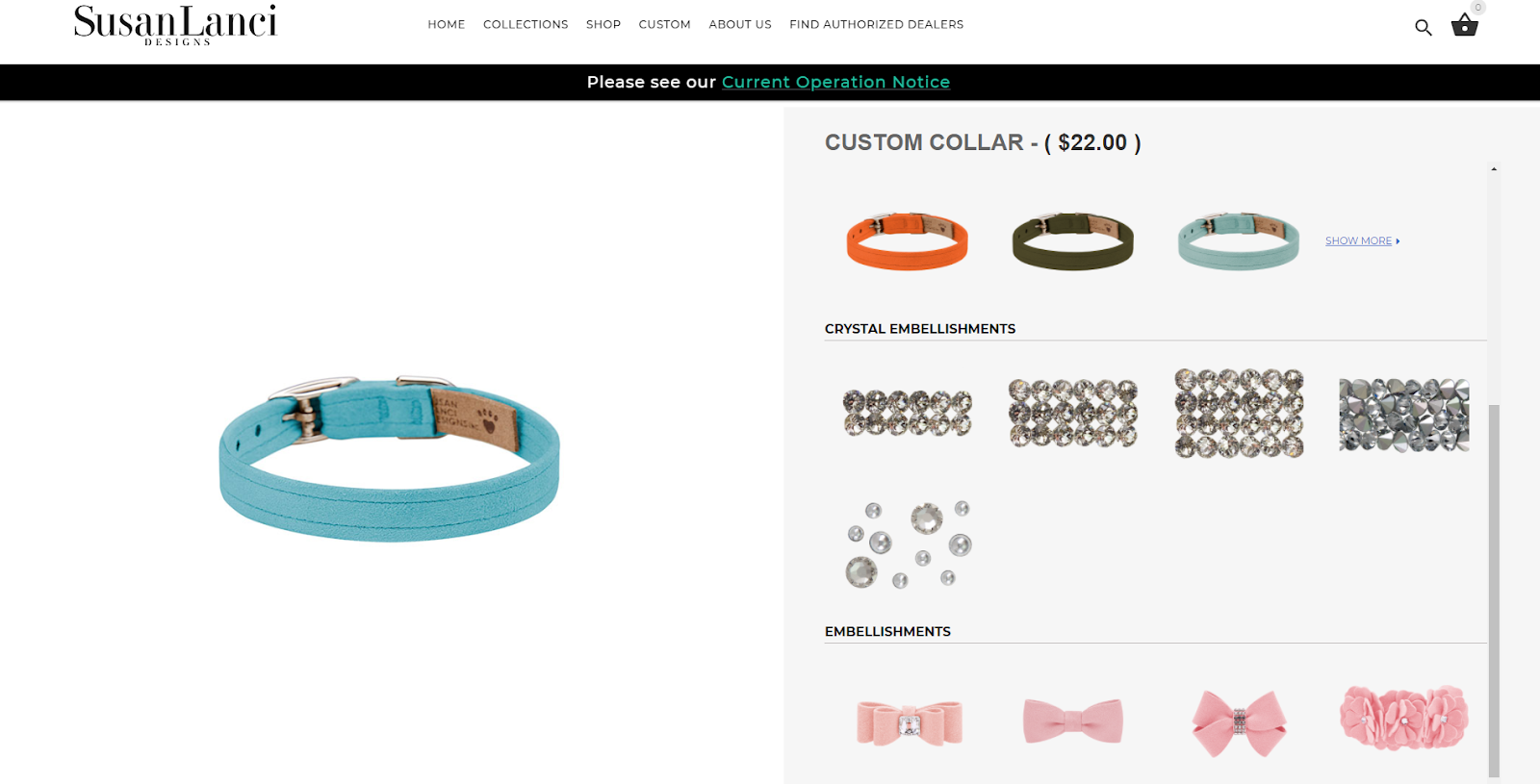
You’re looking to customize your products?
It’s been a long ride! In this article, we’ve talked about:
- Product configurators
- Types of products configurators
- Advantages and disadvantages of product customization
- Various examples of product customization in action
It’s safe to say that allowing your customers more liberty to build their own unique product has its own perks. Providing such a premium service is a huge competitive differentiator and a great way of making sure that your customers really connect with your business.
If implementing a product configurator into your business sounds like something you’d like to see in the future – feel free to reach out to us!
We’re experts in Pimcore development and we’d be more than happy to help you realize your ideas and turn them into successful revenue generators!
And if you’d like some help or consultation regarding your product or data management strategy – contact us and let’s see how we can help!
To help you get started, we’ve prepared some good reads for you! If you’re new to eCommerce, learn more about the benefits of eCommerce to both customers and businesses! And if you’re already looking to start your own business, here’s an 8-step guide for starting your digital commerce business!






